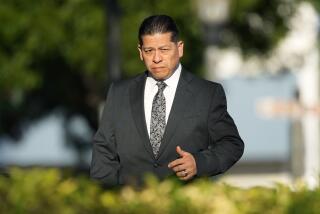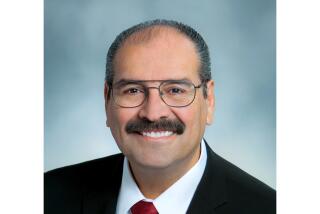Gonzales Disavows Torture Tactics
WASHINGTON — President Bush’s nominee to be attorney general, Alberto R. Gonzales, offered a lawyerly defense today to allegations that as President Bush’s senior legal aide, he had helped craft administration policies that contributed to abuses of military detainees in Cuba and Iraq.
He said that while he participated in discussions about the outer bounds of the use of torture, it was ultimately the job of others to develop final policies and procedures.
Testifying before the Senate Judiciary Committee, the 49-year-old White House counsel, who would be the nation’s first Latino attorney general, condemned the use of torture and said he was “sickened” by photographs of military interrogators abusing prisoners in Iraq.
Gonzales acknowledged that he took part in discussions with Justice Department lawyers in the summer of 2002 that led to a ruling by the department’s Office of Legal Counsel that human rights advocates and others contend laid the groundwork for abuse of suspected terrorists and other detainees.
But he denied that administration policies, including the Justice Department memo, which the department itself repudiated last week, contributed to the litany of abuses that have been reported in recent weeks and months.
He said it was always Bush administration policy that the detainees be treated humanely.
The hearings for the longtime Bush confidante illustrated both the profound concern about his nomination among human rights groups as well as the realities of the newly-enhanced Republican majority in Congress.
A crowd of opponents, some wearing gray and red T-shirts reading “Investigate Gonzales,” packed the hearing room. They were joined by veterans groups and military lawyers concerned that the policies Gonzales helped craft, including his view on the treatment of enemy fighters under the Geneva Convention, put U.S. troops in peril.
Democrats questioned the candor of some of Gonzales’ answers in the hearing, as well as his defense of the administration’s decision-making process. But they also acknowledged that his confirmation by the Senate was a foregone conclusion.
He is considered a relative moderate on many social issues and a toned-down version of the man he is expected to replace, former Sen. John Ashcroft (R-Mo.).
The committee’s new chairman, Sen. Arlen Specter (R-Pa.), said he expected the hearings would conclude later today. The senate is expected to vote later his month on the nomination. Specter indicated the vote could take place before Inauguration Day, Jan. 20.
More to Read
Sign up for Essential California
The most important California stories and recommendations in your inbox every morning.
You may occasionally receive promotional content from the Los Angeles Times.










